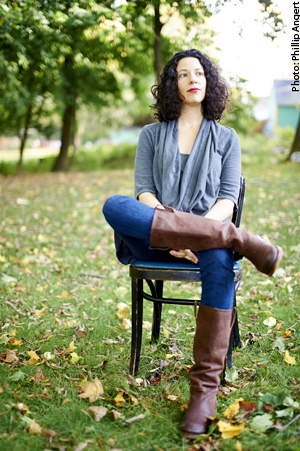Earlier this week, Elisa Albert shared what she’s been reading (and watching) lately. Her new book, After Birth, is now available. She has been blogging here all week for Jewish Book Council’s Visiting Scribe series.
 Judaism has very clear, widely practiced proscriptions for how to support the bereaved, but strangely we don’t talk much about how we support women who are about to or have recently given birth. Which seems remiss, given that birth and death are so clearly on the same continuum, sacred portals at opposite ends of life. If how we process and honor death matters, then how we deal with birth must matter in direct proportion. Probably the Rabbis weren’t so concerned with how women get through the childbearing year because hey, the women had it under control. But given the dire state of childbirth and early motherhood in the here and now, perhaps it’s time we brought these issues into the light, so as to better address them. Here are a few simple ways to be decent to people who are working very hard to bring forth and nurture new life.
Judaism has very clear, widely practiced proscriptions for how to support the bereaved, but strangely we don’t talk much about how we support women who are about to or have recently given birth. Which seems remiss, given that birth and death are so clearly on the same continuum, sacred portals at opposite ends of life. If how we process and honor death matters, then how we deal with birth must matter in direct proportion. Probably the Rabbis weren’t so concerned with how women get through the childbearing year because hey, the women had it under control. But given the dire state of childbirth and early motherhood in the here and now, perhaps it’s time we brought these issues into the light, so as to better address them. Here are a few simple ways to be decent to people who are working very hard to bring forth and nurture new life.
1. Don’t spread negative thoughts and feelings about birth.
It’s a nightmare just get the drugs do whatever they say don’t even try you’re so tiny that baby looks huge are you having twins I almost died it’s the worst pain ever you can’t even imagine I would have died if not for ETC. If we or our sister or mother or friend had a terrible experience giving birth, that’s a real shame, and we should have plenty of space to process that experience. But please understand that terrible birth experiences are not inevitable. Birth is normal and healthy and when properly supported tends to go beautifully, so scaring or threatening pregnant women into submission to all-too-typical terrors and interventions is nothing but a cruel and careless way of avoiding our own regret, confusion, ignorance, pain and/or guilt. KNOCK IT OFF. She’s about to do something heroic and amazing and must summon every iota of her courage and stamina and focus. Unless there is something abnormal about her pregnancy, there is no reason she won’t be absolutely fine with good care. Would we hold up a “You Can’t Do This And You’re Crazy for Trying” sign at a marathon? We would not. So let’s be absolutely sure we keep our perverted birth mythologies to ourselves (and maybe even strive to educate ourselves about where those mythologies come from).
2. Bring Food
When in doubt, bring food. This might be obvious when we’re very, very close to the people in question, but is sometimes less so when we’re more general friends or acquaintances. Too often we fall into the easy trap of thinking “oh, I should leave them alone, I’m sure they don’t want to hear from little old me.” Wrong. Try organizing or participating in a Meal Train (check out the handy-dandy website, which allows you to coordinate with any number of friends, relatives, neighbors, co-workers). Buoy a new mother with all the lasagna she could ever consume. While we’re at her place, why not do the dishes and tidy up and make some tea? Offer to hold the baby while she goes to the bathroom, takes a shower, takes a nap. Take a good look around. What needs doing? Do it. Fun fact: in many parts of the world, women traditionally do not get out of bed for the first thirty days postpartum. They nestle in with their babies and are attended to, fed, and kept company by grandmothers, sisters, friends and relatives. Interestingly, there is very low incidence of postpartum depression where this custom is widely practiced. Perhaps we should rename it “abandoned at her most vulnerable ” depression.
3. Don’t Write Her Off
It’s easy, especially if we’re not in the exact same phase of life, to let friendships fall through the cracks at times like these. Maybe we have older kids and have mercifully forgotten much of what it’s like to have a new baby. Maybe we don’t have kids and the whole idea of new babies makes us a little uncomfortable, or a lot. Maybe we’re defensive because she doesn’t want to go to brunch and hear about our recent J‑Dates just now. (Is J‑Date still a thing?) Maybe we’re hoping to have a baby of our own and the thought of hers fills us with ugly thoughts. Maybe we philosophically disagree about the particulars of pregnancy or birth. Newsflash: none of that matters. If we truly love her and are decent friends, our ego is beside the point. Let’s go back to #2, while firmly reminding ourselves that this is not about us. “Like” every single social media post about the baby. Let her know she’s in our thoughts. When she feels up to it, accompany her on walks and short outings of her design. Love the baby. Coo at the baby. Exclaim over the baby. The beloved friend we used to know will return, if slowly, over some months or years. Give her time, and celebrate the new world order with her. Real friends don’t expect each other to stay exactly the same forever.
4. Be Okay About Her Body
If breastfeeding makes us uncomfortable, in theory or in practice, we should seek therapy. More immediately, we are called upon to pretend that it does not. Making a vulnerable woman who is struggling to master the art of feeding her child in a biologically appropriate manner feel weird or unwelcome or gross or like a political or sexual spectacle is the opposite of a mitzvah. Is there a way we can help her get more comfortable? It’s a safe bet to bring her a glass of water. Be kind. Read her signals. Intuit what she needs. She is nursing a baby: this is important work. We shouldn’t make our hang-ups or projections or ignorance about breasts her problem. We should not make ourselves her problem. She has enough to deal with. If we suggest she go nurse her baby in the bathroom we are officially not decent human beings, the end.
5. Listen
This is usually concurrent with #2 (all roads lead back to BRING FOOD). But here is where we are called upon to be even more open, more gentle, and even more grounded than perhaps we are used to being in everyday life. And here is where our customs around death are perhaps most apt. What do we do at a shiva? We give the bereaved space to talk, laugh, cry, joke, reminisce, or be silent. We hold them in a safe space, a transitional space, in which we ask nothing of them. We create and hold that space, and we do not budge for a set period of time. We cover the mirrors, because it does not matter what we look like right now. We don’t tell them how to grieve. We don’t try to set the tone or impose our thoughts or feelings. We simply make space for whatever feelings, whatever process, whatever idiosyncratic mess of emotion characterizes this particular situation. A new baby is a great simcha, to be sure. A new baby is also a great upheaval. Everything is raw and different and new, and it’s hardly an exaggeration to suggest that these first few days and weeks after birth will likely inform a lot of what’s to come. Let’s be sure to honor this time with the greatest reverence and utmost sensitivity. A revolution of happy, healthy, well loved and well cared for mothers can change the world.
Elisa Albert is the author of the novels After Birth and The Book of Dahlia, the short story collection How This Night is Different, and editor of the anthology Freud’s Blind Spot. She is a 2009 Sami Rohr Prize Fellow and will be blogging here all week for Jewish Book Council’s Visiting Scribe series.
Related Content:
- Visiting Scribe Essays: Parenthood
- Reading List: Parenting Resources
- Labor Day: True Birth Stories by Today’s Best Women Writers by Anna Solomon
Elisa Albert is the author of After Birth, The Book of Dahlia, How This Night Is Different, and editor of the anthology Freud’s Blind Spot. Her stories and essays have appeared in Time, The Guardian, The New York Times, n+1, Bennington Review, Tin House, Michigan Quarterly Review, The Literary Review, the Los Angeles Review of Books, and elsewhere. She lives in upstate New York.



